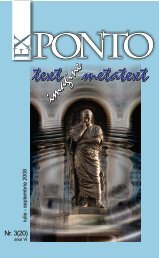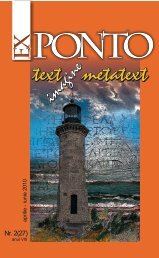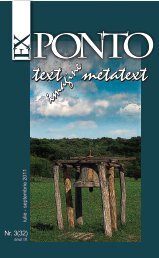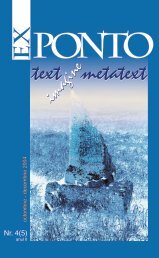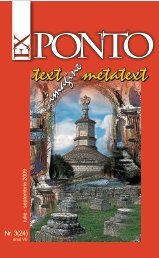Nr. 3 (12) anul IV / iulie-septembrie 2006 - ROMDIDAC
Nr. 3 (12) anul IV / iulie-septembrie 2006 - ROMDIDAC
Nr. 3 (12) anul IV / iulie-septembrie 2006 - ROMDIDAC
- No tags were found...
You also want an ePaper? Increase the reach of your titles
YUMPU automatically turns print PDFs into web optimized ePapers that Google loves.
Ex Ponto nr.3, <strong>2006</strong>assume meaning in the context of social rules, many of which become bindingeven without the means for their enforcement. This is the reason why bothauthors rely on the authority of natural law to understand human society,i.e. that specific trait the stoics have called sociableness. Unlike the type ofutilitarianism coming out of a selfish reading of human nature often imputedto Thomas Hobbes, sociableness for Grotius is based on a syncretic readingof human nature according to which there is a social tendency to coexistencegrounded on the use of reason and on consensus formation around commonvalues and goals 5 . As Howard Williams notes on this subject, “Grotius seesour sociableness as evident in our capacity to speak and use reason. We liketo follow rules in our behaviour with our kind and we are uniquely able to doso because of our ability to think logically and remember similar incidents.In Habermas’s terms, we demonstrate communicative competence” 6 . In thiscontext, communicative competence translates into the use of rational abilityto build consensus among political actors assuming as motivations for actionsomething more than selfishness, relative gains, and material interests.Grotius’s enquiry stems from a clearly normative concern, viz. that it is thegood life of humanity itself which grounds the urge to save international lawfrom the contempt of those eager to demonstrate that it is nothing but shallowwords 7 . The social world is approached as a whole, whence it follows that thisperspective preserves the sphere of interactions constituting the ‘international’from the letdowns of moral scepticism. Therefore, the Grotian rationalismguiding Adriano Moreira’s theorisation is marked by the conviction that thereis an institutional context endorsing the carrying out of social rules and thefulfilment of international justice and, furthermore, that in such context theresort to war must be accounted for as an exceptional though legitimatetool in order to safeguard the reciprocity grounding the contractual web ofinternational society. This version of Grotian rationalism categorically rejectsTrasimacus’s words in Plato’s The Republic according to which justice isnothing but a reflex of the interests of the strong. The resort to force mustbe legitimate and this last recourse ought to be grounded on a higher lawof human sociableness expressing itself through the institutional consensusof states fulfilling the natural potentialities inherent to social conduct. In thissense, war becomes an institution of international society itself, destined topreserve the principles of equality and independence agreed upon by statesin search of mutual recognition and security.The bottom line is that to speak of a Grotian via media in Adriano Moreira’sIR theory means to identify a theoretical body of thought constituted bythose very consensus states are able to agree upon through practice, andwhich cannot ignore the reference to a natural law, vis-à-vis the alternativeapproaches of moral scepticism and emancipatory revolutionism. Therefore,and through its distinctive institutional approach, the Grotian tradition ascribesa purpose to the web of interactions connecting sovereign states and thatovercomes pure utilitarianism. For this rationalist via media, both of theseextreme positions suffer from the same insufficiency, viz. that of ignoring asubstantial part of reality and of the temporal horizon of human sociableness.Moral scepticism ignores the possibility, the urge and the moral pressurefor developing human potentialities according to the cosmopolitan needsof an originary human community; emancipatory revolutionism ignores thesovereignist resistances and the capacity to mobilise people’s allegiancesshown still today by state-centric political ethics. Thus, Adriano Moreira’s IR168






